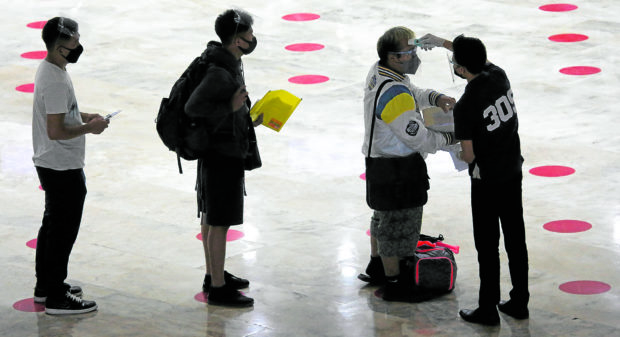Outbound OFWs now priority for COVID-19 booster shots

Passengers lining up for check-in for Philippine Airlines flights bound for the United States undergo health protocols in NAIA terminal 1. INQUIRER FILE PHOTO/LYN RILLON
MANILA, Philippines — Overseas Filipino workers (OFWs) who are scheduled for deployment soon can now get their booster shots against COVID-19.
The Inter-Agency Task Force for the Management of Emerging Infectious Diseases (IATF) has approved the administration of booster shots on both land- and sea-based OFWs who are up for deployment within four months after the intended vaccination date and have completed their vaccination at least six months ago, or at least three months for those who got a single-dose vaccine.
The government’s pandemic task force has yet to give a definite date when this would take effect.
Secretary Carlito Galvez Jr., chief implementer of the National Task Force (NTF) Against COVID-19, said it would be carried out “as soon as necessary” since OFWs scheduled for deployment abroad fall under the A1 category, along with health workers and their immediate family members.
Speaking at the Laging Handa briefing on Saturday, NTF spokesperson Restituto Padilla said OFWs were among the top priority in the government’s vaccination drive as they play a vital role in the country’s economic recovery.
Galvez said the booster shots for OFWs were approved “in order to maintain our competitive advantage and protect our OFWs’ and seafarers’ livelihood if boosters are required for foreign deployment.”
The NTF spokesperson said the administration of booster shots would adhere to protocols set by the vaccine experts. Those who have been vaccinated less than six months ago (or less than three months for those who got a single-dose vaccine) are not qualified to receive the booster shot yet.
Also, OFWs will continue to have their separate lanes at the vaccination sites, he added.
The earliest OFWs could have been fully vaccinated would be in late May (for single-dose vaccine) or June, since they were moved to the expanded A1 category from A4 only on May 27.
The Angkla party list group, which represents seafarers, welcomed the recent decision of the IATF.
Good news for seafarers
“Allowing booster shots for OFWs and seafarers ensures the continuing deployment of Filipino seafarers to the world,” Angkla Rep. Jess Manalo said in a statement.
“This policy will ensure that the country will maintain its status as the top provider of global maritime professionals, as cited by no less than the United Nations Conference on Trade and Development,” he added.
The government started giving booster shots to healthcare workers on Nov. 17. Approved booster shots for them are single doses of Pfizer, Sinovac, and AstraZeneca, and half the regular dose of a Moderna shot.
Health Undersecretary Maria Rosario Vergeire said the administration of booster shots on healthcare workers had been going well so far.
The government has so far provided 2,488 booster doses to healthcare workers, said Vergeire.
About 2 percent of them recorded reactions, such as pain at the vaccination site, a one-day fever, headache and elevated blood pressure, she said.
All these, she said, were managed accordingly and nobody needed to be hospitalized.
A2, A3 categories next
Galvez said the government was planning to launch the booster shots for senior citizens (under A2 category) and immunocompromised individuals (under A3 category) by next week or before December.
Booster shots for those belonging to the A4 category (economic front-liners) and A5 (indigents), and the general population are expected to be given in the first quarter of 2022.
Vergeire said the Department of Health (DOH) was still finalizing the guidelines for the administration of booster shots on senior citizens and immunocompromised individuals.
She said they would also be given the choice to get the same vaccine brand as their first two doses (homologous vaccination) or a different brand (heterologous vaccination), like the healthcare workers.
She said the DOH would later provide data on those who got the same brand for their boosters and those who got a different brand.
The government aims to fully inoculate at least 54 million Filipinos by the end of the year to achieve “population protection.”
As of Nov. 19, data from the National Vaccination Operations Center showed that more than 33 million Filipinos have been fully vaccinated, or 30.3 percent of the country’s more than 110 million population. The average number of daily jabs in the last seven days was 846,481, still below the government target of 1 million to 1.5 million.